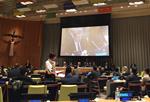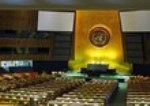Published on Thu, 2015-04-16 10:02
For the first time, the international development agenda, through the FfD3 and post-2015 processes, is considered universal, applying to every country. Current deliberations, however, reveal different understandings of what universality means. To some, the concept overshadows the principle of ‘common but differentiated responsibilities’ (CBDR), agreed in the Rio Declaration and reaffirmed by subsequent global and international documents—a concern voiced by the Indian delegate among others. CBDR roots governments’ obligations in their capacities to solve a given problem, as well as their responsibility for creating it (e.g., historic CO2 emissions). |
Published on Wed, 2015-04-08 11:07
At the opening of the United Nations hearings with business and civil society, Social Watch coordinator Roberto Bissio defends Sustainable Development Goals as expression of a new paradigm. For the SDGs to bare fruit, the power of the biggest 200 corporations, with combined sales that are bigger than the total economies of 180 countries, needs to be harnessed. The UN should not tarnish its image associating its programs with big tax evaders or endorsing private-public partnerships that are exclusive, untransparent and too frequently associated with corruption. A binding legal instrument for business and human rights, while disliked by business leaders, might introduce a predictable framework that ultimately benefits the small and medium entrepreneurs that create most of the jobs in times of crisis. Read his complete intervention here or see the video here or download the pdf version here. |
Published on Tue, 2015-04-07 09:44
The post-2015 development agenda aspires to global transformation. Its content so far, including the set of 17 sustainable development goals (SDGs) agreed in last year’s Open Working Group, affirms that aim through an unprecedented commitment to inclusion, sustainability and universality. This suggests that the world might finally move beyond current imbalanced patterns of consumption and production that have left wide swathes of human deprivation and pushed the limits of planetary boundaries. Yet the main question, after the most recent intergovernmental negotiations on the agenda in March in New York, is: will the political process live up to the agenda’s promise? |
Published on Mon, 2015-04-06 12:00
It is clear that traditional official development assistance will not be enough to finance the SDGs. It will continue to play a key role in the poorest countries and in countries destabilized by strife and conflicts. Alliance Sud is therefore calling for at least half the development budgets of donor countries to go towards the poorest countries. Should development aid budgets remain just as big – or small – as hitherto, greater concentration on the poorest countries would nonetheless create big losers as well. In middle-income countries, current development assistance programmes and projects would have to be abandoned. Total expenditure would need to be increased substantially if this is to be avoided. The old demand for 0.7 per cent of gross national income to be allocated to development aid has therefore lost none of its urgency. |
Published on Mon, 2015-04-06 10:47
The High Level Task Force for the International Conference on Population and Development (HLTF for ICPD) released a paper called “Policy Considerations for Financing Sexual and Reproductive Health and Rights in the Post-2015 Era”. The document makes the case about the importance of sexual and reproductive health and rights (SRHR) for achieving sustainable development and proposes nine recommendations to mobilize sufficient and predicable financing for SRHR services and policies. |
SUSCRIBE TO OUR NEWSLETTER







